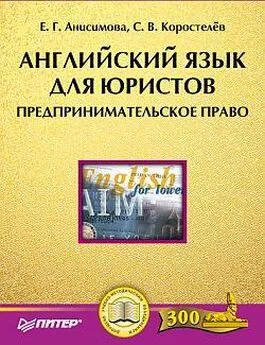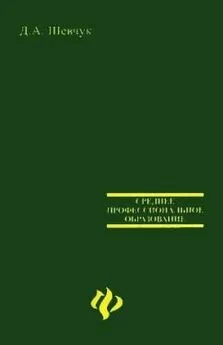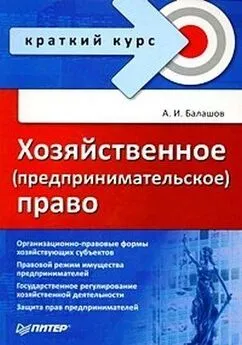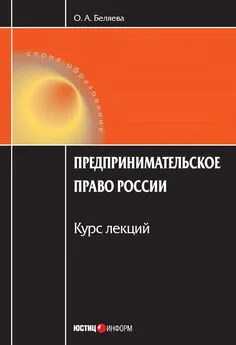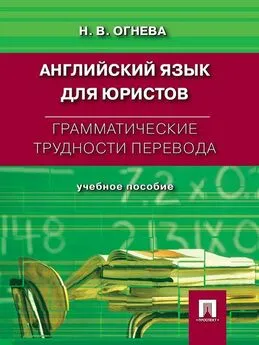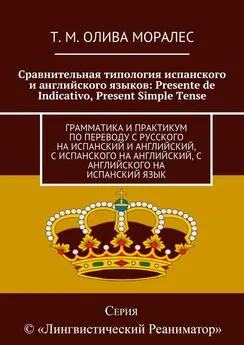Станислав Коростелев - Английский язык для юристов. Предпринимательское право
- Название:Английский язык для юристов. Предпринимательское право
- Автор:
- Жанр:
- Издательство:046ebc0b-b024-102a-94d5-07de47c81719
- Год:2006
- Город:СПб
- ISBN:5-469-01382-0
- Рейтинг:
- Избранное:Добавить в избранное
-
Отзывы:
-
Ваша оценка:
Станислав Коростелев - Английский язык для юристов. Предпринимательское право краткое содержание
Настоящее учебное пособие предназначено для овладения лексикой в области предпринимательского и коммерческого права студентами лингвистических вузов и студентами гражданско-правовой специализации юридических вузов.
Книга призвана дать преподавателям и студентам специальный языковой и профессиональный материал, ориентированный на повышение качества профессиональной подготовки в области правовой лингвистики и международного бизнеса.
Английский язык для юристов. Предпринимательское право - читать онлайн бесплатно ознакомительный отрывок
Интервал:
Закладка:
An anticipatory breach (also called constructive breach) occurs when a party to a contract either expresses or clearly implies an intention not to perform the contract even before being required to act. The repudiation must be clear and absolute. It must also indicate a deliberate and complete refusal to perform according to the terms of the contract. Injured parties may seek damages by showing that by relying on the contract.
Damages describe money awarded to parties who have been victimized or have suffered injury to their legal rights by others. Damages are of different kinds, and the nature of a claim usually determines what type of damages will apply.
A sum of money equal to the real financial loss suffered by the injured party defines actual damages. Since they are intended to compensate the injured party, actual damages are also called compensatory damages. Thus, damages awarded for nondelivery of promised goods or services would be an amount equal to the difference between the price stated in the contract and what the promisee would have to pay elsewhere.
Incidental damages and consequential damages are awarded for losses indirectly, but closely, attributable to a breach. Incidental damages cover any expenses paid out by the innocent party to prevent further loss. Consequential damages result indirectly from the breach because of special circumstances that exist with a particular contract. To recover consequential damages, the injured party must show that such losses were foreseeable when the contract was first made.
Damages awarded in excess of actual, incidental, or inconsequential damages where it is shown that the wrongful party acted with malicious intent and willful disregard for the rights of the injured party are punitive damages, also called exemplary damages.
Token damages awarded to parties who have experienced an injury to their legal rights but no actual loss are nominal damages. In today's practice, the award is usually one dollar.
Speculative damages are computed on losses that have not actually been suffered and that cannot be proved; they are damages based entirely on an expectation of losses that might be suffered from a breach. They differ from future damages in that speculative damages are not founded on fact but only on hope or expectation.
A decree of specific performance is a court order calling for the breaching party to do what he or she promised to do under the original contract of the unique subject matter.
An injunction is an order issued by a court directing that a party do or refrain from doing something. An injunction may be either temporary or permanent.
Exercise 1. Comprehension questions:
1. In what terms must be the contract performed when the time is not stated in the contract?
2. How is satisfactory performance of the contract determined?
3. How may be the contractual conditions classified?
4. What does a condition precedent require?
5. Explain what is a condition concurrent.
6. Think of examples of conditions subsequent.
7. What does tender of performance mean?
8. What does mutual rescission require?
9. Contrast termination by waiver and mutual rescission.
Exercise 2. Find in the text English equivalents to the following:
Прекращение договора до наступления срока исполнения; компенсаторные убытки; оконченное исполнение; взаимозависимые условия; предварительное условие; общий отказ; побочные, случайные убытки; оценочная неустойка; номинальное возмещение; исполнение; убытки, присуждаемые в качестве наказания; разумно необходимый срок; достаточное исполнение; реальное исполнение; исполнение всех существенных условий договора; предложение платежа; предложение исполнения; отказ правообладателя от чего-либо.
Exercise 3. Consult recommended dictionaries and give words or phrases to the following definitions:
Исполнение обязательств надлежащему лицу; исполнение обязательств третьим лицом; исполнение альтернативного обязательства; солидарные обязательства; встречное исполнение обязательства; исполнение обязательств по частям; валюта денежных средств; признание права; взыскание убытков; присуждение к исполнению обязанностей в натуре.
Exercise 4. Be ready to talk on one of the following topics:
1. Compare the different ways the court enforces performance of a contract.
2. Describe the standards that are used to determine whether or not the performance of a contract is satisfactory.
3. Contrast complete performance with substantial performance.
4. Discuss the ways that contracts are discharged.
5. Identify the remedies that are available to an injured party when a contract is breached.
Exercise 5. Make up your own dialog on the case: In Grandi v. LeSage, the buyer purchased a racehorse for breeding purposes. The seller had represented the horse to be a stallion; in fact, the horse was a gelding. The buyer revoked acceptance and brought suit to recover purchase price and incidental damages. The final award included incidental damages for the care, feeding, and maintenance of the horse for about three month at $1.50 per day.
Unit 11
Nature and Kinds
Сущность и виды оборотных документов
К ценным бумагам относятся документы, удостоверяющие с помощью установленной формы и обязательных реквизитов имущественные права, осуществление или передача которых только при их предъявлении (глава 7 ГК РФ). Права, удостоверенные ценной бумагой, могут принадлежать предъявителю ценной бумаги, либо названному в ценной бумаге лицу, либо названному в ценной бумаге лицу, которое может само осуществить эти права, либо назначить своим распоряжением другое управомоченное лицо. К ценным бумагам относятся: государственная облигация, облигация, вексель, чек, депозитный и сберегательный сертификат, банковская сберегательная книжка на предъявителя, коносамент, акция, и др.
– acceptor – акцептант
– bill of exchange – переводной вексель, тратта
– certificate of deposit – депозитный (вкладной) сертификат
– comakers – лицо, берущее на себя обязательство уплатить долг в случае несостоятельности должника
– demand note – простой вексель, срочный по предъявлении
– discounting – дисконт, операции по дисконту, учет (векселей), ставка учета, дисконтирование
– draft – переводный вексель, тратта, чек
– drawee – трассат (лицо, на которое выставлена тратта)
– drawer – трассант, векселедатель, чекодатель
– holder – держатель; владелец; предъявитель (например чека)
– endorsee – индоссат, жират (лицо, в пользу которого сделана передаточная надпись)
– endorser – индоссант, жирант (лицо, делающее передаточную надпись, например, на обороте векселя)
– maker – векселедатель, трассант
– negotiable instrument – оборотный документ
– note – извещение; авизо, кредитный билет; банковый билет; банкнота, счет, простой вексель; долговая расписка
– payee – лицо, получающее платеж; ремитент; векселедержатель
– sight draft – тратта, срочная по предъявлении
– time draft – срочная тратта (платежом через определенный срок после предъявления)
– trade acceptance – акцептованный торговый вексель
A negotiable instrument is a written document that is signed by the maker or drawer and that contains an unconditional promise or order to pay a certain sum of money on delivery or at a definite time to the bearer or to order. The concept of negotiability of commercial paper is simple: When an instrument is transferred by negotiation, the person receiving the instrument is provided with more protection than was available to the person from whom it was received. The person receiving the instrument is able, in many instances, to recover money on the instrument even when the person from whom the instrument was received could not have done so.
There are three basic kinds of negotiable instruments: drafts (including checks), notes, and certificates of deposit.
A draft (also known as a bill of exchange) is an instrument by which the party creating it orders another party to pay money to a third party. The one who draws the draft (that is, the one who orders money to be paid) is called the drawer. The one who is requested to pay the money is called the drawee. The one who is to receive the money is known as the payee.
Drafts may be presented to the drawee for payment, or for acceptance. When a draft is presented for acceptance, the drawee is requested to become liable on the instrument. To accept a draft, the drawee writes «accepted» across the face of the instrument and dates and signs it. By doing this, the drawee agrees to pay the instrument at a later date when it becomes due. An acceptance must be written on the draft, but it may consist of the drawee's signature alone.
A check is a special kind of draft that is drawn on a bank and is payable on demand. A check is also the most common type of draft.
A sight draft is payable as soon as it is presented to the drawee for payment. A time draft is not payable until the lapse of a particular time period stated on the draft.
A trade acceptance is a draft used by a seller of goods to receive payment and also to extend credit. It is often used in combination with a bill of lading, which is a receipt given by a freight company to someone who ships goods. If it is a sight draft, the buyer must pay the draft immediately to receive the bill of lading from the bank. If it is a time draft, the buyer must accept the draft to receive the bill of lading from the bank. The freight company will not release the goods to the buyer unless the buyer has the bill of lading.
Читать дальшеИнтервал:
Закладка:
